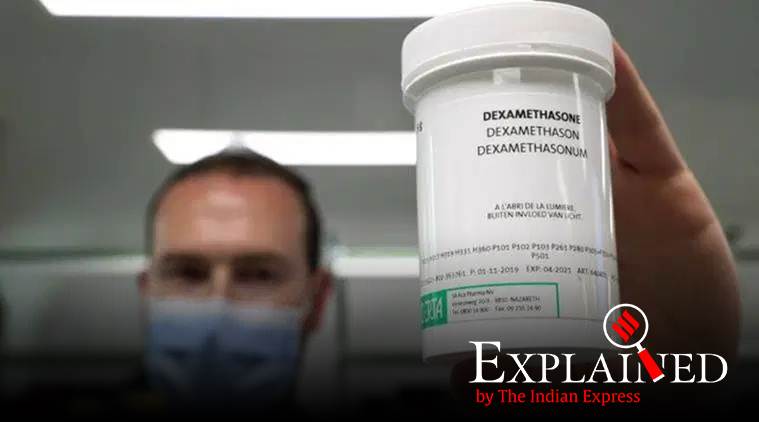A low-cost, widely used steroid, dexamethasone, has become the subject of discussion after researchers from the Recovery Trial reported that it helps reduce death rates in certain Covid-19 patients.
It is an anti-inflammatory drug, commonly used to treat conditions in which the body’s immune system does not function properly, and causes inflammation and tissue damage. Dexamethasone reduces the production of the chemicals that cause inflammation and also reduces the activity of the immune system by affecting the way white blood cells function.

Dexamethasone falls in a category called corticosteroids, which closely mimic cortisol, the hormone naturally produced by the adrenal glands in humans. It is commonly used in treatment for rheumatological inflammatory conditions: inflammations of muscles, inflammation of blood vessels, chronic arthritis, and lupus. It is used in lung diseases, kidney inflammation and eye inflammation, and to reduce swelling associated with tumours of the brain and spine. In cancer patients, it is used to treat nausea and vomiting caused by chemotherapy drugs.
How useful is it in Covid-19 treatment?
There is no specific proven treatment for Covid-19 yet. Patients are being administered different drugs that are approved for treating for other diseases.
During the SARS outbreak in 2003, corticosteroid therapy was used to reduce inflammatory-induced lung injury. In Covid-19, too, many countries are investigating the effectiveness of corticosteroid therapy on patients with an acute respiratory infection. Also, the World Health Organization (WHO) has prioritised the evaluation of corticosteroids in clinical trials to assess safety and efficacy.
In interim guidelines on Covid-19 treatment released on May 27, the WHO has recommended “against the routine of systematic corticosteroid” for treatment of viral pneumonia. It said a systematic review and meta-analysis of the impact of corticosteroid therapy on persons with SARS-CoV-2, SARS-CoV and MERS-CoV revealed corticosteroids did not significantly reduce the risk of death, did not reduce hospitalisation duration, ICU admission rate and/or use of mechanical ventilation, and had several adverse effects.
Also in Explained | A badminton legend, a football star, latest Covid-19 drug: what’s common?
Story continues below this ad
So, what has newly been reported?
The Recovery Trial in the UK has an arm investigating dexamethasone. Oxford researchers this week announced the results of the dexamethasone trial, where 2,104 enrolled patients were administered 6 mg of the drug for 10 days. The drug was found to have reduced deaths by one-third in ventilated patients and by one-fifth in patients receiving only oxygen.
“Based on these results, 1 (one) death would be prevented by treatment of around 8 ventilated patients, or around 25 patients requiring oxygen alone,” the university said. It said the drug was found to have reduced the 28-day mortality rate by 17 per cent, with a “highly significant” trend showing “greatest benefit” among patients requiring ventilation.
How significant are these findings?
First, the study found no evidence of benefit for patients who did not require oxygen. Peter Horby, professor of Emerging Infectious Diseases in Nuffield Department of Medicine, Oxford University, acknowledged that survival benefit is clear and large only in patients who are sick enough to require oxygen treatment.
Also, the trial did not study patients outside the hospital setting. Therefore, the drug is not recommended to the large population of mild patients.
Story continues below this ad
Does India use corticosteroid therapy?
Yes. The clinical management protocol for Covid-19 released by the Health Ministry allows the use of the corticosteroid methylprednisolone. For moderate cases, the protocol is: “Consider IV methylprednisolone 0.5 to 1 mg/kg for 3 days (preferably within 48 hours of admission or if oxygen requirement is increasing and if inflammatory markers are increased)”. And for severe cases: “For patients with progressive deterioration of oxygenation indicators, rapid worsening on imaging and excessive activation of the body’s inflammatory response, glucocorticoids can be used for a short period of time (3 to 5 days). It is recommended that dose should not exceed the equivalent of methylprednisolone 1 – 2mg/kg/day”.
Dexamethasone: What are the side effects?
The Health Ministry protocol says a larger dose of glucocorticoid will delay the removal of coronavirus due to immunosuppressive effects.
On May 25, The Lancet published a correspondence that said “improper use of systemic corticosteroids can increase the risk of osteonecrosis of the femoral head (ONFH)”. Osteonecrosis refers to the death of bone tissue due to lack of blood supply.
Also, the WHO says that “given the lack of effectiveness and possible harm”, routine corticosteroids should be avoided unless they are indicated for another reason. “Other reasons may include exacerbation of asthma or chronic obstructive pulmonary disease (COPD), septic shock or ARDS, and risk/benefit analysis needs to be conducted for individual patients.”

 Dexamethasone reduces the production of the chemicals that cause inflammation.
Dexamethasone reduces the production of the chemicals that cause inflammation.





































